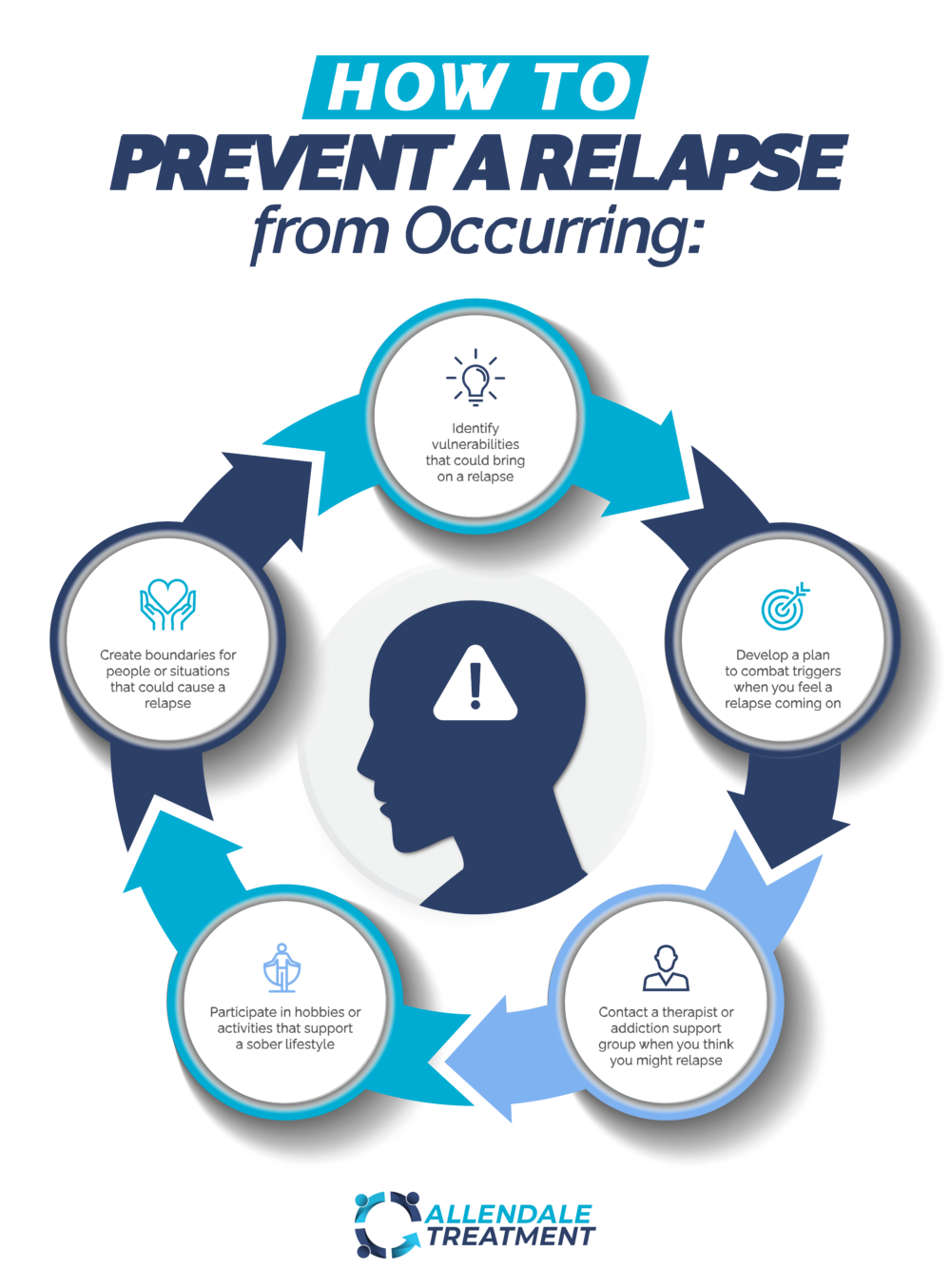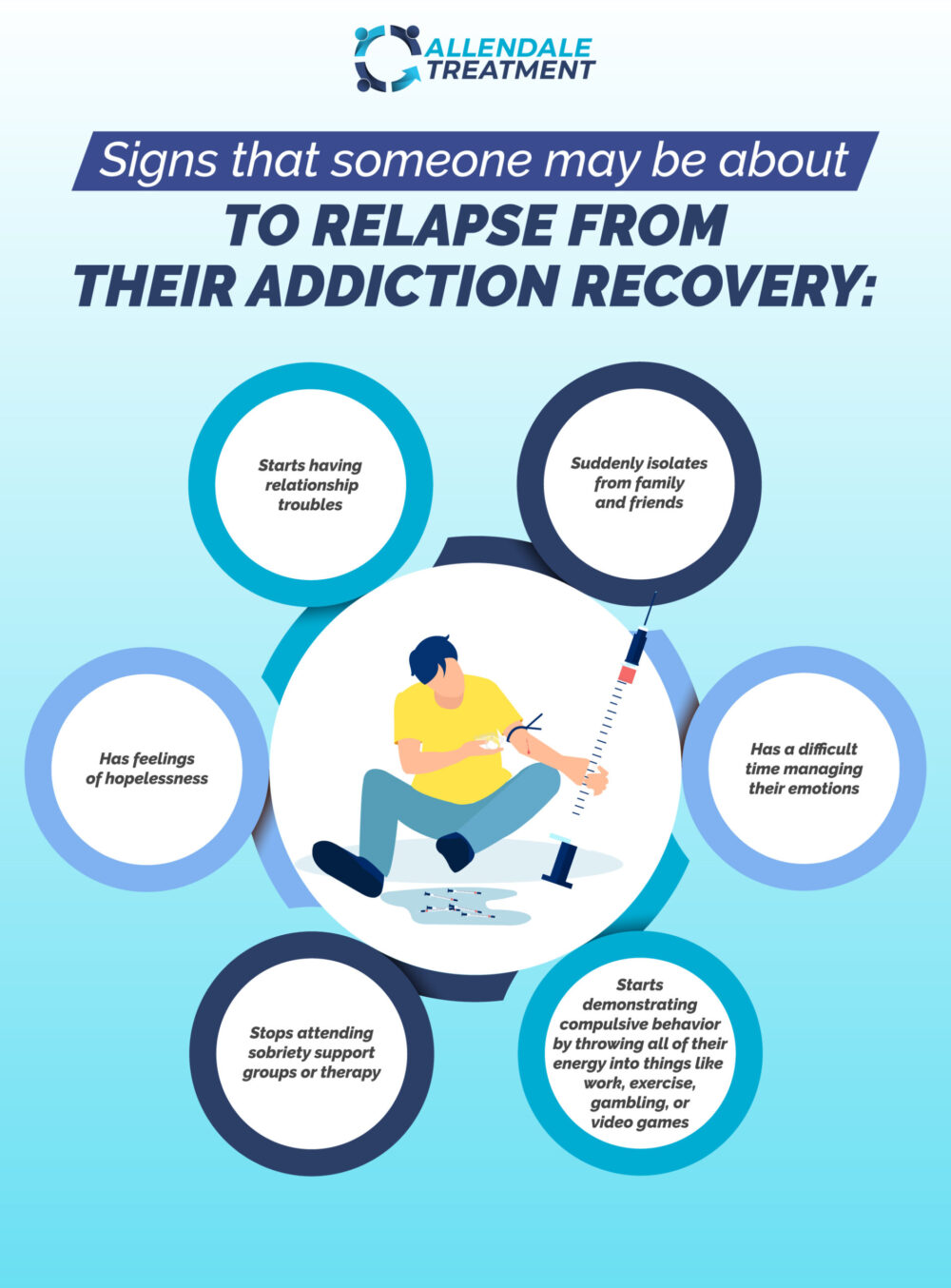Hitting the Reset Button: Why Relapsing Doesn’t Equal Failure in Recovery
Hitting the Reset Button: Why Relapsing Doesn’t Equal Failure in Recovery
Deciding to go to a detox or rehabilitation facility to get help for an addiction is often the first step for people who are struggling with a substance abuse disorder. Even if someone successfully completes a drug or alcohol rehabilitation program, there’s always a risk of a relapse occurring.
Updated: 2023
Written by: Allendale Treatment
If you or anyone you know are struggling with addiction, call (833) 338-6946 to speak with a professional.
In fact, 40 to 60 percent of people relapse after treatment. To prevent a relapse from occurring, it’s important to identify what risk factors could contribute to a relapse and what steps people can take to prevent one from occurring.
Common Causes of Relapse
While studies seem to be inconclusive about the role things like gender, race, ethnicity, or socioeconomic status plays in relapse – certain drugs make people more vulnerable to relapse than others. People addicted to opiates experience the highest rate with one study finding as many as 91% of those in recovery from an opiate addiction experience a relapse. The study also found that at least 59% of those who experienced an opiate relapse would do so within the first week of sobriety.
Subsequently, according to The Butler Center for Research at Hazelton Betty Ford Foundation, 68% of people who were able to successfully complete a substance abuse treatment program for alcohol or marijuana maintained their sobriety. The reason for this has to do with the degree of intensity that certain substances like heroin have on the brain. Tommy Streeter, a community outreach coordinator for Allendale Treatment and Fort Wayne Recovery says that getting the drugs out of his body was half the battle. “The physical withdrawal I was experiencing was so intense that I would spend the rest of the day finding a way to score more heroin,” says Streeter. “So, getting out of that environment and going to a treatment center was the only way I was able to get sober.”
Co-occurring substance abuse problems and mental health issues are other common reasons why people relapse according to reports published in the Journal of the American Medical Association. People with behavioral health issues such as anxiety or depression are at a higher risk of relapsing and the number of times a person relapse is also higher when they have a mental disorder. Streeter says this is why people need to undergo a dual diagnosis treatment approach when trying to recover from their addiction. “Mental health issues are always underlying factors that drive addiction and unless those issues are addressed, it’s going to be difficult to prevent a relapse from occurring,” says Streeter.
How To Prevent a Relapse from Occurring
Understanding what triggers make someone more vulnerable to experiencing a relapse is often the first step in preventing one from occurring. Inpatient and outpatient treatment programs will help people in recovery learn how to identify these triggers and develop a plan when they encounter them. Streeter says that It’s also important for the person to continue to work on their sobriety after leaving treatment by staying active in programs such as AA or community support groups. “When someone comes to me for advice after they relapse, I always ask them what they were doing to stay sober. Most of the time they say they were focused on their job or spending time with family but they weren’t participating in any kind of recovery program which can be the key to preventing a relapse from occurring,” says Streeter.
People will also need to learn how to establish boundaries in their lives from situations or people who put them at a greater risk of relapsing. For example, if they feel pressured by friends or family members to drink at a family gathering or smoke marijuana, then they need to know that it’s okay for them to stay away from that situation.
Nate Moellering, a community outreach coordinator at Allendale Treatment and Fort Wayne Recovery says that the best way for someone to learn how to set boundaries is through a recovery program. “We have to learn how to live life without a substance in our body,” says Moellering. “This sounds very simple but active addiction is complete chaos and that’s why people in recovery need to practice structure, boundaries and discipline. You need to surround yourself with people who will hold you accountable and keep you on the path to recovery.”
It’s important to keep in mind that when someone is engaging in a recovery program like 12-Step they need to be committed to maintaining their sobriety by working on things like relationship issues and learning new techniques to manage stress such as practicing mindfulness. They should also establish both short- and long-term goals to keep them engaged in their recovery. “If you just focus on staying sober from drugs and alcohol, you are not going to make it,” says Streeter.


Long-Term Sobriety Is Still Possible After a Relapse
It’s important to remember that sobriety is a marathon, not a sprint and that even if a relapse occurs, it’s still possible to stay sober. Whether it’s undergoing additional therapy to deal with behavioral health issues, using meditation and exercise to reframe thoughts when a relapse is coming on, or attending group therapy sessions, Streeter says that it’s important to figure out what works best for each individual. “I had someone reach out to me who had tried multiple times to stay sober and kept failing,” says Streeter. “It wasn’t until he started a 12-Step program that he was able to maintain his sobriety.”
People struggling with recovery may experience feelings of failure, shame and guilt if they relapse but on average, people in recovery relapse 2 times before they achieve long-term sobriety. Moellering says that was the case for him. He relapsed several times and is now 5 years sober. “I’ve failed multiple times but all it takes is one time to be successful,” says Moellering. “People should never give up on their sobriety and know that help is always available to them when they need it.”
If you or anyone you know are struggling with addiction, call (833) 338-6946 to speak with a professional.


